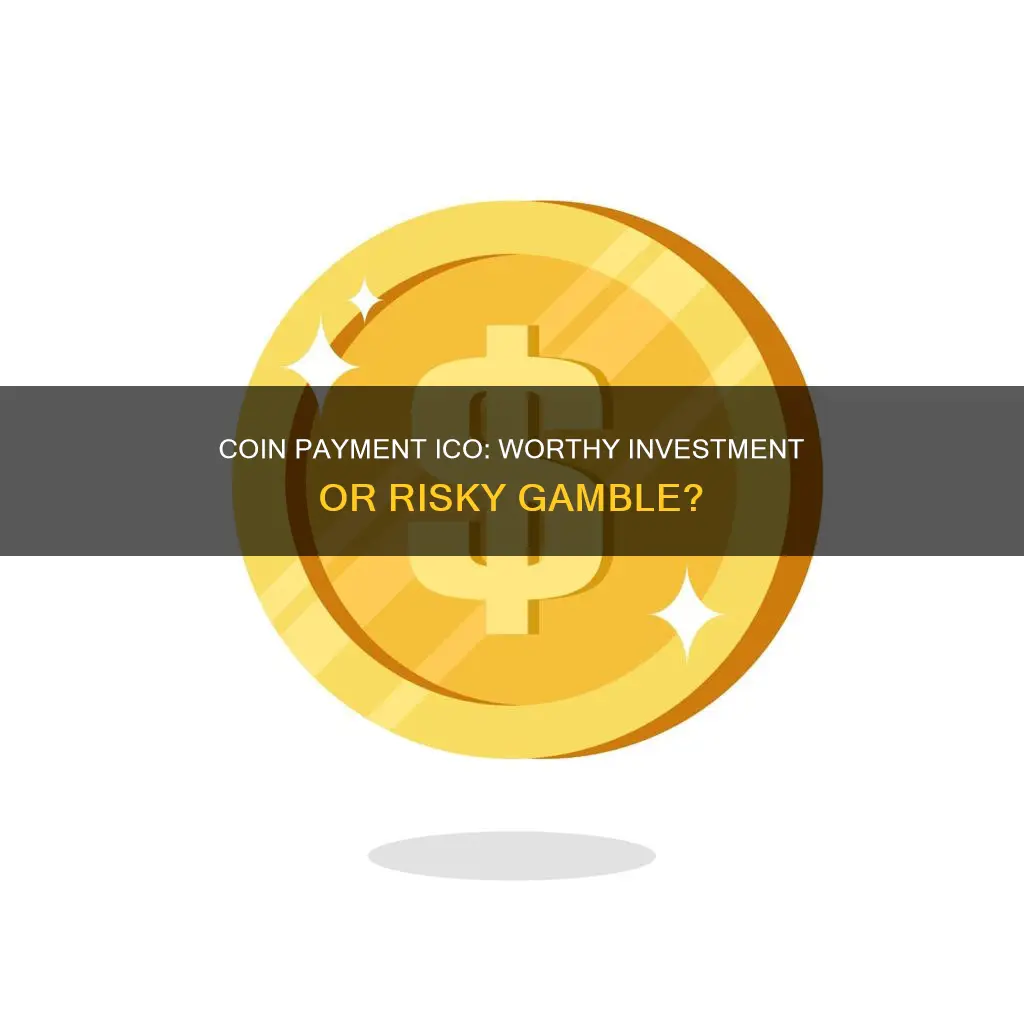
An initial coin offering (ICO) is a type of funding using cryptocurrencies. It is often a form of crowdfunding, although a private ICO that does not seek public investment is also possible. In an ICO, a blockchain-based startup mints a certain quantity of its own native digital token and offers them to early investors, usually in exchange for other cryptocurrencies such as Bitcoin or Ether.
ICOs can be a source of capital for startup companies, allowing them to avoid regulations that prevent them from seeking investment directly from the public. However, ICOs may fall outside existing regulations and have been used as a vehicle for scams and fraud.
Due diligence is essential when considering investing in an ICO. Investors should review the project's team, white paper, and roadmap, as well as look for signs of security such as third-party audits of the computer code.
What You'll Learn

What is an ICO?
An initial coin offering (ICO) is a fundraising method for new cryptocurrency projects. It is the cryptocurrency industry's equivalent of an initial public offering (IPO) in the stock market.
When a company decides to have an ICO, it announces the date, rules, and buying process in advance. On the date of the ICO, investors can buy the new cryptocurrency. Most ICOs require investors to pay using another cryptocurrency, such as Bitcoin or Ethereum, though some also accept fiat money. The purchase process typically involves sending money to a specified crypto wallet address.
The number of tokens sold during an ICO and the token price can be either fixed or variable. For example, a company might set a fixed number of tokens to be sold at a variable price, meaning that the more funding they receive, the higher the token price.
ICOs are largely unregulated and are considered extremely risky. They are also susceptible to scams and fraudulent activity. Due diligence is highly recommended for anyone considering investing in an ICO.
The Ultimate Guide to Bitcoin: Account and Trade
You may want to see also

ICOs as a source of capital for startups
Initial coin offerings (ICOs) are a novel form of funding that has driven billions of dollars into the blockchain ecosystem, potentially challenging traditional funding vehicles such as business angel or venture capital investments. ICOs can allow startups to avoid regulations that prevent them from seeking investment directly from the public, and intermediaries such as venture capitalists, banks, and stock exchanges, which may demand greater scrutiny and some percentage of future profits or joint ownership.
ICOs are a popular way to raise funds for products and services related to cryptocurrency. They are similar to initial public offerings (IPOs) but concern the public sale of cryptocurrencies, whereas IPOs concern stocks. Anyone can launch an ICO, but they are monitored closely by regulators in the US and other developed nations to ensure they are registered if necessary.
ICOs can be structured in a few different ways:
- Static supply and static price: A company sets a specific funding goal or limit, with each token sold in the ICO having a preset price, and the total token supply is fixed.
- Static supply and dynamic price: The ICO has a static supply of tokens but a dynamic funding goal, meaning the value or price of those tokens can change.
- Dynamic supply and static price: The ICO has a dynamic token supply but a static price, meaning the amount of funding received determines the supply.
ICOs are a notoriously risky investment. The crypto space is still largely unregulated, and investors are not afforded many of the same protections as those in the stock market. There is a real chance that investors could lose their money.
ICOs can be a source of capital for startups, but they are also used as a vehicle for scams and fraud. It is important to be cautious when investing in an ICO.
Shipwreck Coins: Worthy Investment or Risky Business?
You may want to see also

ICOs and crowdfunding
ICOs, or Initial Coin Offerings, are the cryptocurrency industry's equivalent of an IPO, or Initial Public Offering. They are a way for companies to raise funds for a blockchain-related project by offering tokens in exchange for capital. These tokens may have some utility related to the product or service the company is offering or represent a stake in the company or project.
ICOs are similar to IPOs, but with some key differences. IPOs involve the public sale of stocks, while ICOs concern the public sale of cryptocurrencies. IPOs also have a very standard process involving multiple parties and regulators, whereas bringing a new crypto to the market is more of a do-it-yourself process.
ICOs can be structured in a few different ways:
- Static supply and static price: A company sets a specific funding goal or limit, with each token sold having a preset value and a fixed supply.
- Static supply and dynamic price: There is a static supply of tokens but a dynamic funding goal, meaning the value or price of the tokens can change.
- Dynamic supply and static price: Tokens have a predetermined value or price, but the supply is not static, meaning there is no set funding goal.
ICOs are a form of crowdfunding, which is a way to fund a project or venture by raising small amounts of money from a large number of people. With the rise of crypto-backed projects, crowdfunding has taken on a new dimension.
The first cryptocurrency, Bitcoin, was released in 2009 and is still the most popular cryptocurrency today. Since then, thousands of other cryptocurrencies have been created, and many have raised money through ICOs.
ICOs have been used in scams and fraudulent schemes, so it is important to do your research before investing in one. Some red flags to look out for include vague or poorly written project plans, inexperienced team members, and a lack of business partnerships. It is also important to ensure that the ICO meets legal requirements and is registered with the appropriate authorities.
While ICOs can be risky, they also offer the potential for high returns. Investors who get in on the ground floor of a successful crypto startup can stand to benefit significantly if the cryptocurrency appreciates in value.
Piedfort Coins: Smart Investment or Risky Gamble?
You may want to see also

ICOs as a mechanism for scams
ICOs, or Initial Coin Offerings, are a popular way to raise funds for products and services related to cryptocurrencies. They are the cryptocurrency industry's equivalent of an IPO, or Initial Public Offering.
ICOs are a mechanism for scams, with a high percentage identified as fraudulent ventures. A study by the Satis Group found that 78% of ICOs in 2017 were scams, and only 8% reached the trading stage on cryptocurrency exchanges. Another study of 5,036 ICOs from 2014 to 2019 found that 576 were scams, totalling $10.12 billion in losses.
The unregulated nature of ICOs makes them vulnerable to fraudulent activity. Unlike IPOs, ICOs are not subject to strict legal regulations and only require a white paper to get started. This lack of regulatory oversight means that anyone can launch an ICO, regardless of their qualifications or experience. As a result, ICOs have become an attractive vehicle for scammers looking to exploit unsuspecting investors.
There are several types of ICO scams, including:
- Classic exit scams: The developers and promoters collect funds and then disappear without a trace, leaving investors with no information or recourse.
- Bounty scams: ICOs that fail to pay out promoters who were promised rewards (usually in the form of tokens) for their PR activities.
- Previous scammers: The same group of developers is found to be conducting scams across multiple projects.
- Airdrop scams: Scammers create booby traps to steal users' private keys and ultimately their coins.
- Exchange scams: Developers launch their ICO on a fraudulent exchange to deceive investors.
- White paper plagiarism scams: Scammers copy the white paper of a promising ICO and launch it under a different name.
- "Pump and dump" scams: Investors are rushed to buy tokens at a low price, and then the price drops abruptly after the scammers have completed their sales.
- Ponzi scams: Investors are promised returns if they invest in a product or service associated with the ICO.
- Website scams: Scammers launch websites that are similar in name and design to existing projects, tricking naive investors.
- "Porn" scams: An ICO offers premium access to a porn site or products, taking advantage of the fact that users are less likely to report it due to the sensitive nature of the content.
- Pre-mine scams: Tokens are shared among developers and promoters instead of being burned, leading to a higher token circulation supply and a lower token price.
- Phishing and fraud: Investors receive spam emails, suspicious links, and pop-ups, leading to personal and financial information being compromised.
Given the high prevalence of scams in the ICO market, it is crucial for investors to conduct extensive due diligence before considering investing in an ICO.
Elon's Dogecoin Bet: Millions Invested, a Crypto Future?
You may want to see also

Legality of ICOs
The legality of ICOs varies by jurisdiction. In the US, ICOs are considered securities offerings and must be registered with the Securities and Exchange Commission (SEC) or have an exemption on file with the SEC. ICOs that are not registered with the SEC may still be legal, but they are likely to require registration if they accept funding from sources other than venture capital funds, private equity funds, hedge funds, or other accredited investors.
ICOs are banned in some jurisdictions, such as China and South Korea. In other jurisdictions, such as the UK, ICOs are legal but are considered high-risk and speculative investments. The European Securities and Markets Authority (ESMA) has noted the high risks associated with ICOs and the risk that investors may lose all their cash.
Even if an ICO is not explicitly illegal, it may still be subject to regulation as a security. In the US, the Howey Test is used to determine whether a coin issue meets the criteria of a security. If it does, the SEC will consider it an unregistered security sale and force compliance.
To avoid legal issues, it is important for those considering an ICO to seek advice and counselling from professionals who can help define the legal matters involved. Some key considerations include the structure of the project, the jurisdiction in which the ICO will be conducted, and compliance with financial surveillance laws such as Know Your Customer (KYC) and Anti-Money Laundering (AML) rules.
The Ultimate Guide to Long-Term Ripple Bitcoin Investing
You may want to see also
Frequently asked questions
ICO stands for "Initial Coin Offering". It is a type of crowdfunding where a blockchain-based startup mints and offers its own native digital token to early investors in exchange for other cryptocurrencies.
Investing in an ICO is considered high-risk. The market is under-regulated and investors have little protection if an ICO fails or turns out to be fraudulent.
You should review the project's team, white paper, and roadmap. You should also check if any computer code has been audited by a third party and look for typos on the website, which could be a red flag.







